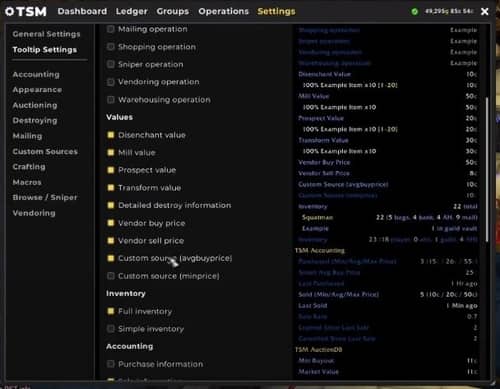

Select Custom Sources from the left vertical menu.On the horizontal top menu, go to Settings.Once again, open the TSM Core by typing “ /tsm” in-game.If you like what we do and want to support the continued development of TradeSkillMaster and also get priority access to all of our betas, please consider becoming a TSM Premium user. I cannot wait to get all of these new tools into the hands of our amazing community! If you want to ensure you get into the beta as soon as possible, you can go ahead and sign up for an invite here. This second example will round DBRegionMarketAvg to the nearest 1000g for epic quality items (ItemQuality 4) or to the nearest 1g otherwise. Round(DBRegionMarketAvg, ifeq(ItemQuality, 4, 1000g, 1g)) The above function will return the DBMarket if DBRegionSoldPerDay is less than 100, otherwise it’ll return DBRegionMarketAvg. Iflt(DBRegionSoldPerDay, 100, DBMarket, DBRegionMarketAvg) Not all of these values are prices, hence the new name of “value sources.” These are the value sources that will be available with the launch of TSM4 for use in custom prices:īelow are a few examples which demonstrate the power of the new custom prices changes coming with TSM4. In TSM4, our goal is to expose as many values as possible for use directly in custom prices. We currently provide other pieces of data such as sale rate and number of expires in item tooltips, but there is currently no way to use this data in custom prices directly. We currently offer many different prices from various sources including AuctionDB, Accounting, and more, but we recognize that these are not the only values that are important to TSM users when configuring their operations. If no value of “b” is sent in, then the functions round to the nearest copper, as appropriate. For example, “round(crafting, 10s)” would return the crafting cost rounded to the nearest 10 silver. The first value “a” is the number you want to round and the second value “b” is the factor you would like to round to. You can send in 1 to 2 values in the format round(a, b). The “Round” functions also follow a similar usage to each other. If it is not, the value of “d” is given back if one was supplied, otherwise the whole thing is treated as invalid. If it is, the value of “c” is given back to us. TSM4 then looks at which “IF” function you are using, in our example I am using “if greater than”, so it checks if “a is greater than b”.

TSM4 checks if “a” and “b” are valid in the same method used for check() above. You can send in 3 to 4 values in the format of ifgt(a, b, c, d) where d can be optional. The “IF” functions are all used in the same way. Rounddown() – “Always Round Down – aka Floor” Roundup() – “Always Round Up – aka Ceiling” With that in mind, TSM4 adds the following new functions: In TSM4, one of our main goals was to expand on the logic-based functionality of the check() function and make it easier and more intuitive for our users to incorporate logic in their custom prices. If you did not supply a value for “c” and “a” is not is not greater than 0, then the whole thing is treated as invalid. If “a” is greater than 0, the custom price will give you the value of “b” back, otherwise it gives the value for “c”. If “a” is not valid, the custom price returns invalid. The check() function then takes a look at “a”, and looks to see if it is valid and greater than 0. These 3 values can be any value TSM recognizes, from custom prices to flat gold values, to simple price source references like DBMarket. To quickly explain check(), you can feed it 2 to 3 values in the format of check(a, b, c) where “c” can be optional. I’m pretty sure I used TSM for over a year before I fully understood it! In my own personal experience, check() is definitely something that at times can be hard to wrap your brain around. Many users have become somewhat aware of the check() function in TSM3 thanks to the popularity of BilisOnyxia’s sniper string.


 0 kommentar(er)
0 kommentar(er)
